Related Research Articles
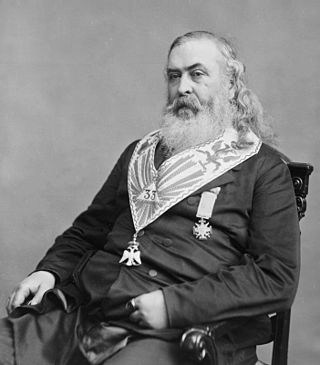
Albert Pike was an American author, poet, orator, editor, lawyer, jurist and Confederate States Army general who served as an associate justice of the Arkansas Supreme Court in exile from 1864 to 1865. He had previously served as a senior officer of the Confederate States Army, commanding the District of Indian Territory in the Trans-Mississippi Theater. A prominent member of the Freemasons and a staunch opponent of racial equality, Pike served as the Sovereign Grand Commander of the Supreme Council, Scottish Rite, Southern Jurisdiction from 1859 to 1891.

The Ku Klux Klan, commonly shortened to the KKK or the Klan, is the name of several historical and current American white supremacist, far-right terrorist organizations and hate groups. Various commentators, including Fergus Bordewich, have characterized the Klan as America's first terrorist group. Their primary targets, at various times and places, have been African Americans, Jews, and Catholics.

Nathan Bedford Forrest was a Confederate States Army general during the American Civil War and later the first Grand Wizard of the Ku Klux Klan from 1867 to 1869.
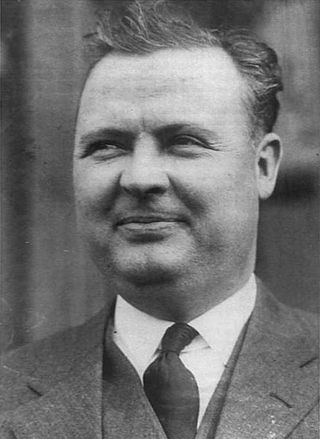
David Curtis "Steve" Stephenson was an American Ku Klux Klan leader, convicted rapist and murderer. In 1923 he was appointed Grand Dragon of the Indiana Klan and head of Klan recruiting for seven other states. Later that year, he led those groups to independence from the national KKK organization. Amassing wealth and political power in Indiana politics, he was one of the most prominent national Klan leaders. He had close relationships with numerous Indiana politicians, especially Governor Edward L. Jackson.

The Commercial Appeal is a daily newspaper of Memphis, Tennessee, and its surrounding metropolitan area. It is owned by the Gannett Company; its former owner, the E. W. Scripps Company, also owned the former afternoon paper, the Memphis Press-Scimitar, which it folded in 1983. The 2016 purchase by Gannett of Journal Media Group effectively gave it control of the two major papers in western and central Tennessee, uniting the Commercial Appeal with Nashville's The Tennessean.
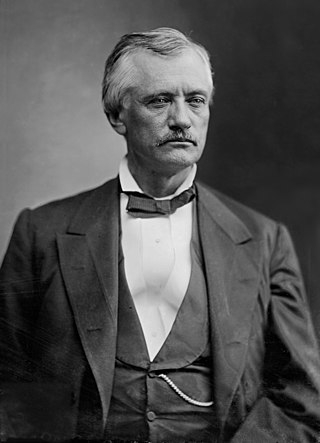
John Tyler Morgan was an American politician who was a brigadier general in the Confederate States Army during the American Civil War and later was elected for six terms as the U.S. Senator (1877–1907) from the state of Alabama. A prominent slaveholder before the Civil War, he became the second Grand Dragon of the Ku Klux Klan in Alabama during the Reconstruction era. Morgan and fellow Klan member Edmund W. Pettus became the ringleaders of white supremacy in Alabama and did more than anyone else in the state to overthrow Reconstruction efforts in the wake of the Civil War. When President Ulysses S. Grant dispatched U.S. Attorney General Amos Akerman to prosecute the Klan under the Enforcement Acts, Morgan was arrested and jailed.
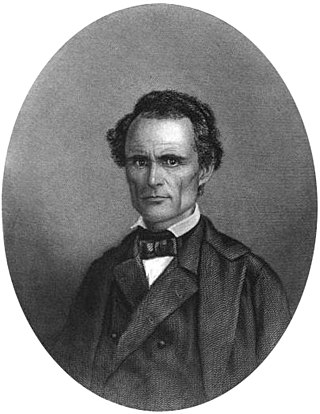
West Hughes Humphreys was the 3rd Attorney General of Tennessee and a United States district judge of the United States District Court for the Eastern District of Tennessee, the United States District Court for the Middle District of Tennessee, and the United States District Court for the Western District of Tennessee.
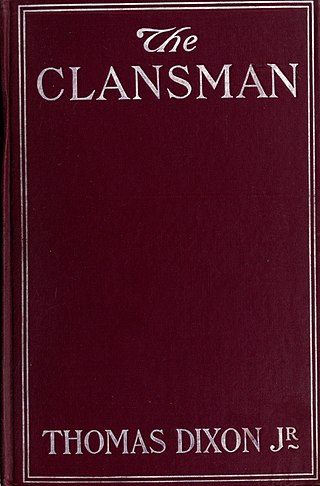
The Clansman: A Historical Romance of the Ku Klux Klan is a novel published in 1905, the second work in the Ku Klux Klan trilogy by Thomas Dixon Jr.. Chronicling the American Civil War and Reconstruction era from a pro-Confederate perspective, it presents the Ku Klux Klan heroically. The novel was adapted first by the author as a highly successful play entitled The Clansman (1905), and a decade later by D. W. Griffith in the 1915 movie The Birth of a Nation.

George Washington Gordon was a general in the Confederate States Army during the American Civil War. After the war, he practiced law in Pulaski, Tennessee, where the Ku Klux Klan was formed. He became one of the Klan's first members. In 1867, Gordon became the Klan's first Grand Dragon for the Realm of Tennessee, and wrote its "Precept," a book describing its organization, purpose, and principles. He was also a member of the United States House of Representatives for the 10th congressional district of Tennessee.
This is a partial list of notable historical figures in U.S. national politics who were members of the Ku Klux Klan before taking office. Membership of the Klan is secret. Political opponents sometimes allege that a person was a member of the Klan, or was supported at the polls by Klan members.
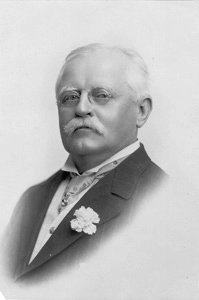
Julian Shakespeare Carr was an American industrialist, philanthropist, and white supremacist. He is the namesake of the town of Carrboro, North Carolina.

The Maxwell House Hotel was a major hotel in downtown Nashville. Because of its stature, seven US Presidents and other prominent guests stayed there over the years. It was built by Colonel John Overton Jr. and named for his wife, Harriet (Maxwell) Overton. The architect was Isaiah Rogers.
James Geddes Stahlman was an American newspaper publisher and philanthropist. He was the publisher of the Nashville Banner. He was opposed to desegregation.
Leroy Magnum McAfee was an American Confederate veteran and politician. He was a member of the North Carolina House of Representatives. He later served as the inspiration for the protagonist of his nephew Thomas Dixon Jr.'s infamous 1905 play The Clansman: A Historical Romance of the Ku Klux Klan and its 1915 film adaptation The Birth of a Nation.
Anthony Dickinson Sayre was an Alabama lawyer and politician who notably served as a state legislator in the Alabama House of Representatives (1890–1893), as the President of the Alabama State Senate (1896–1897), and later as an Associate Justice of the Supreme Court of Alabama (1909–1931). Influential in Alabama politics for nearly half-a-century, Sayre is widely regarded by historians as the legal architect who laid the foundation for the state's discriminatory Jim Crow laws.

John Watson Morton was an American Confederate military officer, farmer and politician. Educated at the Western Military Institute, he entered military service soon after graduation, with the outbreak of war. He served as captain of artillery under General Nathan Bedford Forrest in the Confederate States Army during the American Civil War. Afterward he was the founder of the Nashville chapter of the Ku Klux Klan during the Reconstruction era.
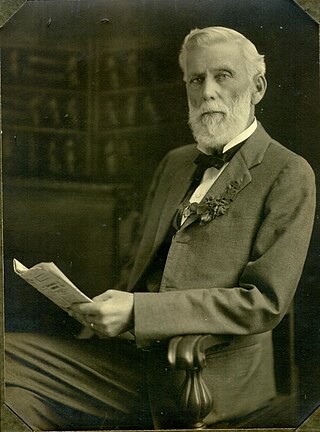
Richard Alexander Sneed was an American Confederate veteran, Klansman and politician. After serving in the Confederate States Army during the American Civil War of 1861-1865, he was a co-founder of the Ku Klux Klan chapter in Madison County, Tennessee. A Democrat, he served as the Oklahoma Secretary of State from 1923 to 1927, the Oklahoma State Treasurer from 1927 to 1931, and the Oklahoma Secretary of State again from 1931 to 1935.

Lamar Fontaine was an American military officer, spy, surveyor, poet and author. He served in the Mexican–American War and the American Civil War, and he was a member of the Ku Klux Klan. He drew maps of Palestine, Japan and China. He authored poetry and a memoir.

Marcus B. Toney was an American Confederate veteran, Klansman and Masonic leader who worked for the Tennessee Central Railroad. He was the author of The Privations of a Private, a memoir about his service in the Confederate States Army. He was the founding president of the Home for Aged Masons.

The Julius Freed House is a historic house in Trenton, Tennessee. It was built in 1871-1872 for Prussian-born Confederate veteran and Klansman Julius Freed. It is listed on the National Register of Historic Places.
References
- 1 2 3 4 5 6 7 8 9 10 "R. R. Sneed Dies At Jackson Home" . The Tennessean. June 15, 1947. p. 6. Retrieved May 1, 2018– via Newspapers.com.
- 1 2 3 4 5 6 7 8 9 10 11 12 "R. R. Sneed, Clerk and Master of Chancery Court, Dies At 72" . The Jackson Sun. June 15, 1947. p. 1. Retrieved May 1, 2018– via Newspapers.com.
- ↑ "Local Historical Society To Hear Atty. R. R. Sneed" . The Jackson Sun. Jackson, Tennessee. March 12, 1944. p. 1. Retrieved May 1, 2018– via Newspapers.com.
Mr Sneed's father, Col. R. A. Sneed, served as commander of the United Confederate Veterans and was one of the organizers of the Ku Klux Klan in Madison County in the Reconstruction Era when lawlessness was so rampant as to demand the super-government.
- 1 2 "E. L. Bullock Funeral Today. Obsequeies Will Be Conducted At Jackson, Tenn., This Afternoon" . The Leaf-Chronicle. Clarksville, Tennessee. August 10, 1914. p. 5. Retrieved May 1, 2018– via Newspapers.com.
- 1 2 "Reappointment of Richard R. Sneed" . The Jackson Sun. Jackson, Tennessee. August 16, 1940. p. 4 – via Newspapers.com.
- 1 2 "Mrs R. R. Sneed Dies Last Night At Local Hospital" . The Jackson Sun. Jackson, Tennessee. March 10, 1961. p. 8. Retrieved May 1, 2018– via Newspapers.com.